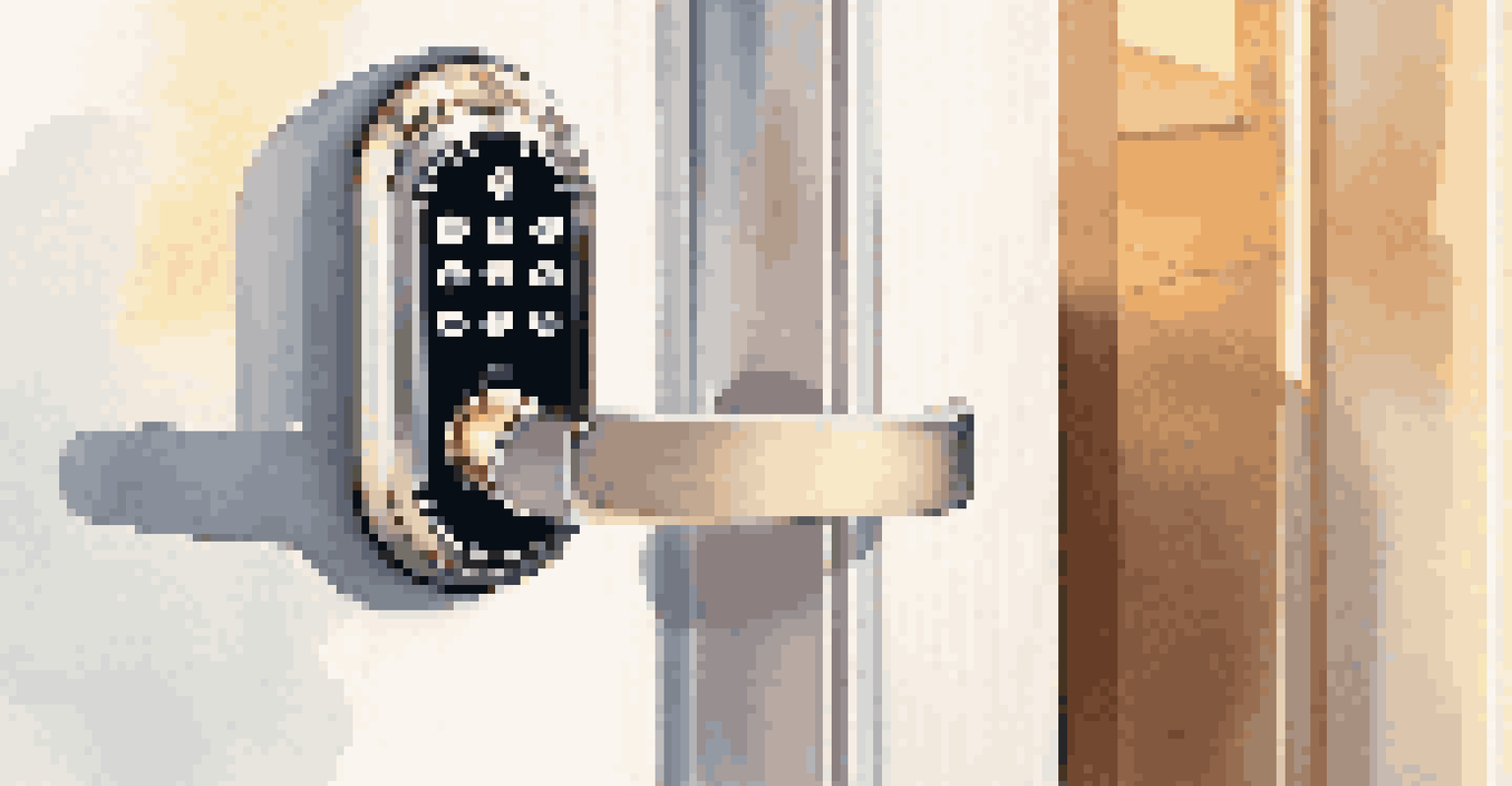The Importance of Home Security in Rental Properties

Why Home Security is Essential for Rental Properties
Home security may not be the first thing on a tenant's mind, but it plays a crucial role in their safety and peace of mind. When you rent a property, you're often placing your trust in the landlord to provide a secure living environment. However, the reality is that not every rental property comes with adequate security measures.
Safety is not a gadget but a state of mind.
A well-secured rental can deter potential break-ins and create a sense of community among tenants. This sense of safety can not only attract more renters but also increase the overall value of the property. After all, who wouldn't want to live in a place where they feel secure?
Landlords should prioritize investing in home security systems to protect their tenants and their property. A simple alarm system or smart locks can make a world of difference, leading to happier tenants and lower turnover rates.
Common Security Risks in Rental Properties
Rental properties can be particularly vulnerable to security risks due to the constant change in occupants. Previous tenants may have duplicated keys or left windows unlocked, creating potential entry points for intruders. This makes it essential for landlords to assess and address these vulnerabilities proactively.

Additionally, in multi-unit complexes, shared entrances and hallways can pose security challenges. It’s crucial for property owners to implement security measures that cover common areas, such as surveillance cameras or controlled access systems. This not only protects individual units but also fosters a safer community atmosphere.
Importance of Security for Rentals
Home security is crucial for tenant safety and can enhance the attractiveness and value of rental properties.
Understanding these risks can help both landlords and tenants take necessary precautions. By being aware of common vulnerabilities, they can work together to create a more secure living environment.
Benefits of Security Systems for Tenants
For tenants, having a security system in place can lead to a sense of comfort and safety. Knowing that their home is monitored can alleviate anxiety and allow them to focus on enjoying their living space. This peace of mind is invaluable, especially for those living in urban areas where crime rates may be higher.
An ounce of prevention is worth a pound of cure.
Moreover, many modern security systems offer features like mobile alerts, allowing tenants to keep an eye on their property even when they’re away. This technology empowers renters to take control of their security and respond quickly to any potential issues.
Ultimately, when tenants feel safe, they are more likely to stay longer and treat the property with care. This can save landlords money on turnover costs and contribute to a positive landlord-tenant relationship.
Landlords' Role in Enhancing Security
Landlords have a significant responsibility when it comes to enhancing security in rental properties. It's their duty not only to maintain the property but also to ensure the safety of their tenants. This may involve conducting regular security assessments to identify and address potential weaknesses.
In addition to physical security measures, landlords should also educate tenants about safety practices. Simple tips, like locking doors and using deadbolts, can go a long way in preventing break-ins. Open communication about security can foster a sense of community and shared responsibility among tenants.
Shared Security Responsibilities
Both landlords and tenants have vital roles in maintaining security, fostering a safer living environment through collaboration.
By taking proactive steps, landlords can create a safer environment that benefits everyone involved. This commitment to security can lead to long-term tenants and a reputable property management brand.
Tenant Responsibility in Home Security
While landlords play a key role in security, tenants also have responsibilities to help keep their homes safe. Simple actions like securing windows and doors, and being mindful of who they allow into the property can greatly reduce risks. It's essential for tenants to be vigilant and proactive about their safety.
Moreover, tenants should report any security concerns or suspicious activities to their landlords promptly. This helps create a culture of safety and encourages landlords to take action when necessary. Building this rapport can help both parties feel more secure in their living arrangements.
Ultimately, home security is a shared responsibility, and when both landlords and tenants work together, it creates a safer, more enjoyable living experience.
Choosing the Right Security System for Rentals
Selecting the right security system for rental properties involves considering the specific needs of the tenants and the property itself. Systems can range from basic locks and alarms to advanced smart home technology that integrates with mobile devices. It's vital to strike a balance between effective security and tenant comfort.
For instance, while smart locks offer convenience, they require a level of tech-savviness from tenants. Therefore, landlords should provide clear instructions and support to ensure tenants feel comfortable using these systems. This can enhance the overall security experience for everyone involved.
Future of Rental Security Tech
The evolution of smart security technology will continue to shape the rental market, making properties with advanced systems more appealing to renters.
Ultimately, the right security system should be easy to use, effective, and fit within the rental property’s budget. By investing in the right technology, landlords can show their commitment to tenant safety while also enhancing the property’s appeal.
Legal Considerations for Home Security in Rentals
When it comes to home security in rental properties, there are legal considerations that both landlords and tenants should be aware of. Many regions have specific laws regarding security measures, such as the obligation to provide working locks and alarms. Understanding these laws can help landlords avoid potential legal issues and ensure tenant safety.
Additionally, landlords should be mindful of privacy laws when implementing surveillance systems. It's important to communicate clearly with tenants about where cameras are located and how the footage will be used. Transparency fosters trust and helps maintain a good landlord-tenant relationship.

By staying informed about these legal aspects, landlords can better protect themselves and their tenants. This not only enhances security but also promotes a respectful and lawful living environment.
The Future of Security in Rental Properties
As technology continues to evolve, so too will the landscape of home security in rental properties. Innovations like smart home systems and AI-driven security features are becoming increasingly accessible, offering enhanced protection for both landlords and tenants. Staying ahead of these trends can provide a competitive edge in the rental market.
Moreover, as more renters prioritize safety, properties equipped with modern security features may become more desirable. This shift underscores the importance of investing in robust security measures to attract and retain tenants. Properties that embrace these advancements are likely to foster a thriving community.
In summary, the future of home security in rentals is bright, driven by technology and an increased awareness of safety. By adapting to these changes, landlords can ensure their properties remain safe, secure, and appealing to potential tenants.